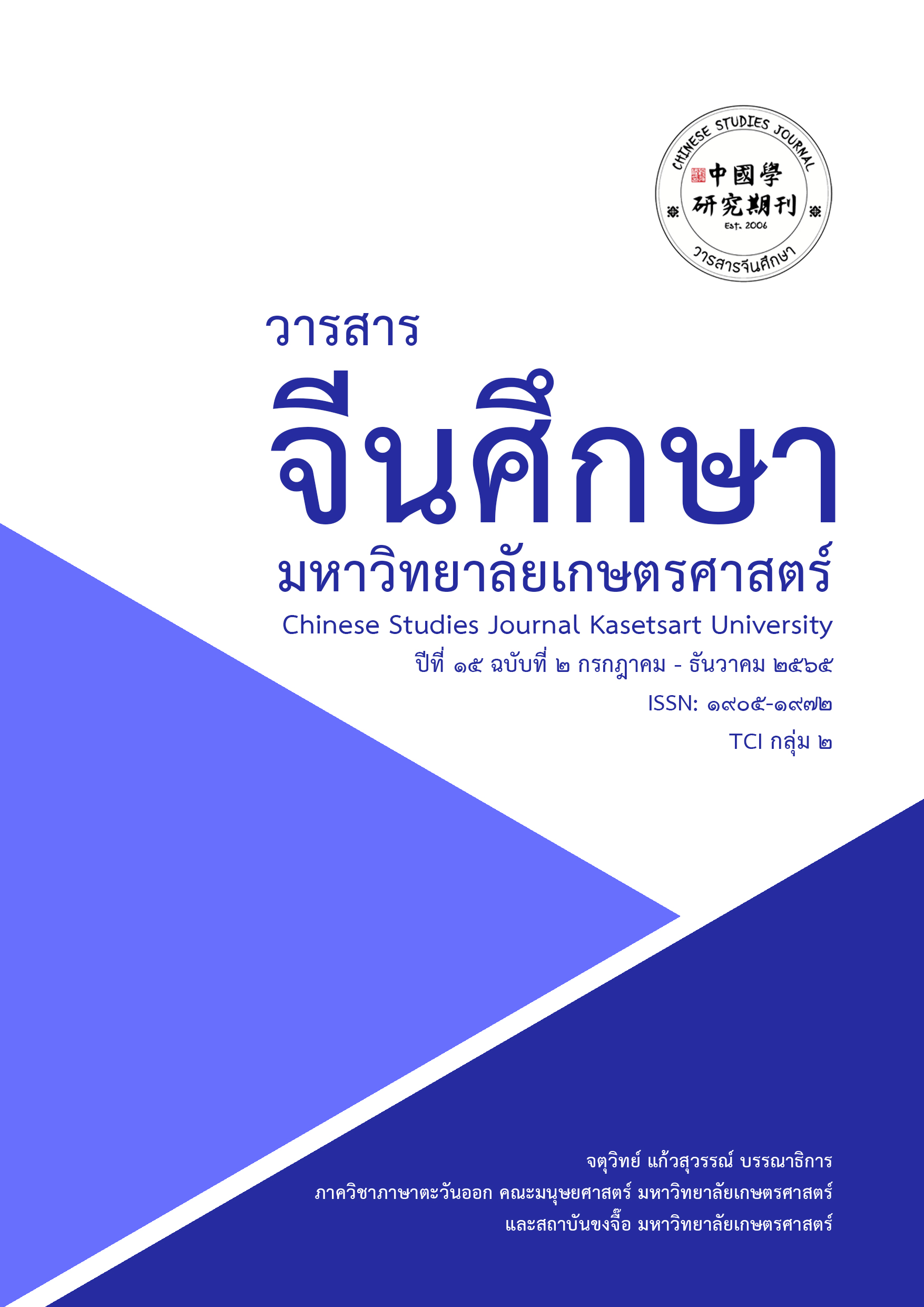The Relationship of Interlocutors and the Use of Address terms in Modern Chinese ความสัมพันธ์ของคู่สนทนากับการใช้คำเรียกขานภาษาจีน ในสมัยปัจจุบัน
Main Article Content
Abstract
This article aims to present the relationship of Interlocutors and the use of Address terms in modern Chinese, applying Pragmatic theory which states that people use language to do things, and use language differently depending on the situation they are in. The purpose of research is therefore to find out the use of Chinese address terms based on three factors: gender, social status and degrees of intimacy, and emotions between interlocutors. The samples of Chinese address terms in this research were collected from eighteen Chinese tv series on WeTv app (2018-2021). The results were found as follows; 1) Gender factor not only influenced the forms of Chinese address, but also influenced the choice of address terms. 2) Social status and degrees of intimacy are two factors influencing the choice of Chinese address terms. The speakers address intimate interlocutors who have the equal or lower social status by their’s “Name”. In contrast, the speakers used “Position/Status/Career” and “Male/Female address term” to address persons of higher social status or older person. 3) Emotional factor, Chinese people used the similar forms of address when they feel normal, sad or fear, but they used “Other Nouns” to address addressee when they feel happy or angry.
Article Details

This work is licensed under a Creative Commons Attribution-NonCommercial-NoDerivatives 4.0 International License.
ผลงานทางวิชาการที่ลงตีพิมพ์ในวารสารจีนศึกษา มหาวิทยาลัยเกษตรศาสตร์ เป็นลิขสิทธิ์ของผู้เขียนหรือผู้แปลผลงานนั้น หากนำลงในวารสารจีนศึกษาเป็นครั้งแรก เจ้าของผลงานสามารถนำไปตีพิมพ์ซ้ำในวารสารหรือหนังสืออื่นได้โดยมิต้องแจ้งให้ทราบล่วงหน้า แต่หากผลงานที่ได้รับพิจารณานำลงในวารสารจีนศึกษา เป็นผลงานที่เคยตีพิมพ์ที่อื่นมาก่อนเจ้าของผลงานต้องจัดการเรื่องปัญหาลิขสิทธิ์กับแหล่งพิมพ์แรกเอง หากเกิดปัญหาทางกฎหมาย ถือว่าไม่อยู่ในความรับผิดชอบของวารสารจีนศึกษา มหาวิทยาลัยเกษตรศาสตร์ ทั้งนี้ ความคิดเห็นต่างๆ ในบทความเป็นความคิดเห็นส่วนตัวของผู้เขียน ไม่เกี่ยวกับกองบรรณาธิการวารสารจีนศึกษา มหาวิทยาลัยเกษตรศาสตร์
References
กัลยา ติงศภัทิย์, ม.ร.ว. และ อมรา ประสิทธิ์รัฐสินธุ์. (2531). การใช้คำเรียกขานในภาษาไทยสมัยกรุงรัตนโกสินทร์: รายงานผลการวิจัย. โครงการเผยแพร่ผลงานวิจัย ฝ่ายวิจัย จุฬาลงกรณ์มหาวิทยาลัย.
จันทิมา อังคพณิชกิจ. (2557). การวิเคราะห์ข้อความ. สำนักพิมพ์มหาวิทยาลัยธรรมศาสตร์.
ดียู ศรีนราวัฒน์. (2559). ภาษาและภาษาศาสตร์ (พิมพ์ครั้งที่2). สำนักพิมพ์มหาวิทยาลัยธรรมศาสตร์.
ติง เจี๋ยเฟิน. (2548). การเปรียบเทียบการใช้คำเรียกขานในภาษาไทยกับภาษาจีน [วิทยานิพนธ์ปริญญามหาบัณฑิต, มหาวิทยาลัยศรีนครินทรวิโรฒ]. The central library of Srinakharinwirot University. http://search.swu.ac.th/permalink /f/1hfhn9m/ALEPH_MONO000083409
เธียรชัย เอี่ยมวรเมธ. (2563). พจนานุกรมจีน-ไทย ฉบับใหม่. อมรการพิมพ์.
นันธิกานต์ จันทร์อภิบาล. (2554). การใช้คำเรียกขานคู่สนทนาที่ไม่คุ้นเคย [วิทยานิพนธ์ปริญญามหาบัณฑิต, มหาวิทยาลัยศรีนครินทรวิโรฒ]. The central library of Srinakharinwirot University. http://search.swu.ac.th/permalink/f/ 1hfhn9m/ALEPH_MONO000331872
ประกาศสำนักนายกรัฐมนตรี เรื่อง หลักเกณฑ์การทับศัพท์ภาษาจีนและภาษาฮินดู พ.ศ.2550. (2549, 22 ธันวาคม). ราชกิจจานุเบกษา. เล่ม 124 ตอนพิเศษ 2 ง. หน้า 1.
เมชฌ สอดส่องกฤษ. (2553). วัฒนธรรมการใช้ภาษาไทยและภาษาจีน: ระบบคำเรียกขาน.โรงพิมพ์มหาวิทยาลัยอุบลราชธานี.
ราชบัณฑิตยสถาน. (2556). พจนานุกรมฉบับราชบัณฑิตยสถาน พ.ศ. 2554. นานมีบุ๊คส์พับลิเคชั่น.
陈芝芳. (2014). 从权势与等同关系看称谓中的“老/小”+姓, 语文学刊, 2014(13), 17-18,28.
马宏基、常庆丰. (1998).称谓语. 新华出版社.
孟昭兰. (2005).情绪心理学. 北京大学出版社.
齐会杰. (2020). 浅析汉语称谓语的演变.文化产业, 2020(18), 114-115.
秦旭. (2001). 称谓言语行为的语用方式、功能及语境制约. 扬州教育 学院学报,2001(1), 23-27.
任娟娟. (2019). 语用身份视角下汉语称呼语泛化现象研究. 浙江外国语 学院学报,2019(5), 60-67.
吴晓君. (2006). “姓+称呼语”一类结构研究 [硕士学位论文, 湖南师范大学]. China National Knowledge Infrastructure (CNKI).
易正中. (2013). “小+姓氏+哥/姐” 一种值得推广的面称方式.
现代语文(语言研究版), 2013(01), 73-75.
张丽静. (2020). 认知语言学视角下的英汉称谓语对比研究. 产业与科技论坛 ,2020(16), 183-184.
张少华. (2008). 情绪心理学. 暨南大学出版社.
中国社会科学院语言研究所词典编辑室编. (2016). 现代汉语词典 (第七版). 商务印书馆.
Austin, J.L. (1962). How to Do Things with Words. Oxford University press.
Coates, J. (1992). Address. In William Bright (Ed.), International Encyclopedia of Linguistics. (pp.23-24). Oxford University press.
Yang, X. (2010). Address Forms of English: Rules and Variations. The Journal of Language Teaching and Research, 5(1), 743-745.


